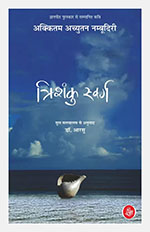Akkitham Achuthan Namboothiri’s poems emanate from a peculiar and intense turmoil of the soul. Their existence is a manifestation of the expansive human consciousness traversing the realms of ideation and affect. त्रिशंकु, the Hindi translation of Namboothiri’s select Malayalam poems by Dr. Arasu, brings together fifty-one poetic compositions, each of which is a journey, a myth, a fragment, a thought, a reminder of the untranslatable, and an epitome of the inevitable dilemmas and desires we all either create, sustain, resist or live with. Trishanku is a poignant motif for a situation which is as Sisyphean as it is Icarian. Apart from the varied meanings, it particularly evokes the legend of the King Trishanku who wished to reach heaven with his physical body intact. Terming it impracticable and almost blasphemous, Trishanku is dissuaded from actualizing his desire by gods and sages alike. But he proceeds, undeterred, and upon reaching the gates of heaven, is pushed and flung back into the void between earth and heaven. Only with Sage Vishwamitra’s conjuring is Trishanku halted midway, and held aloft, upside down, in a parallel heaven created just for him. What must it feel like to receive, at last, such joy tinged with pain, such attainment with a hint of absurdity?
Akkitham’s poems convey this in-between yet wilful state of being, as he explores the cultural, religious, ethical thresholds and boundaries in life, nature and literature.

